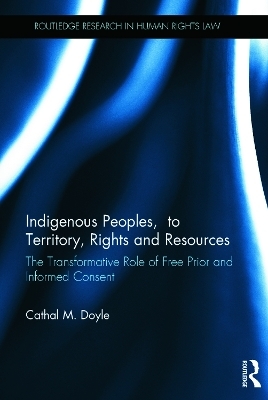
Indigenous Peoples, Title to Territory, Rights and Resources
Routledge (Verlag)
978-0-415-74776-9 (ISBN)
Cathal Doyle examines the evolution of the contemporary concept of FPIC and the main challenges and debates associated with its recognition and implementation. Drawing on existing jurisprudence and evolving international standards, policies and practices, Doyle argues that FPIC constitutes an emerging norm of international law, which is derived from indigenous peoples’ self-determination, territorial and cultural rights, and is fundamental to their realization. This rights consistent version of FPIC guarantees that the responses to questions and challenges posed by the extractive industry’s increasingly pervasive reach will be provided by indigenous peoples themselves.
The book will be of great interest and value to students and researchers of public international law, and indigenous peoples and human rights.
Cathal M. Doyle is a Research Fellow at Middlesex University Business School. He was previously associated with Middlesex University School of Law, where he completed his PhD. Prior to pursuing his PhD he worked as a management consultant for over 10 years in Accenture with global financial, retail and manufacturing sector clients.
Introduction Part I: The Role of Indigenous Peoples’ Consent in Legitimizing Title to Territory 1. The Genesis of Indigenous Consent under International Law and its role in Legitimizing Title to Territory 2. Nineteenth Century Positivists and divergence between the role of Consent in theory and practice Part II: The Requirement for Free Prior and Informed Consent in The Normative Framework of Indigenous Peoples Rights 3. The Evolving Consent Requirement Under The ILO System 4. The Self-Determination Grounded Normative Framework of Indigenous Rights 5. FPIC and the Normative Framework of Indigenous Peoples Rights 6. Debates in relation to the consent requirement Part III: Implementation of Free Prior and Informed Consent – Challenges and Opportunities 7. The Evolving Practice of States and International Organizations 8. FPIC and the Corporate Obligation to Respect Indigenous Peoples Rights 9. Operationalization of Consent, Challenges, Limitations and Opportunities Conclusion
| Reihe/Serie | Routledge Research in Human Rights Law |
|---|---|
| Verlagsort | London |
| Sprache | englisch |
| Maße | 156 x 234 mm |
| Gewicht | 635 g |
| Themenwelt | Geisteswissenschaften ► Philosophie |
| Recht / Steuern ► Allgemeines / Lexika | |
| Recht / Steuern ► EU / Internationales Recht | |
| Recht / Steuern ► Öffentliches Recht ► Völkerrecht | |
| Sozialwissenschaften ► Ethnologie | |
| Sozialwissenschaften ► Politik / Verwaltung | |
| Sozialwissenschaften ► Soziologie ► Spezielle Soziologien | |
| ISBN-10 | 0-415-74776-7 / 0415747767 |
| ISBN-13 | 978-0-415-74776-9 / 9780415747769 |
| Zustand | Neuware |
| Haben Sie eine Frage zum Produkt? |
aus dem Bereich


